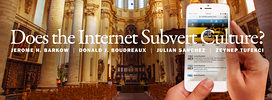Jerome Barkow writes that his lead essay “is simply not about whether the world is going to hell in a handbasket. It is about how, if we are going to understand our Internetted world, we need to learn more about the evolved mechanisms that, in the past, mediated the transmission/editing of cultural information but whose operation, today, is having unpredictable results and producing disruptive change.”
My apologies if, in my earlier responses, I read too much into Prof. Barkow’s lead essay. That essay did strike me as suggesting that the Internet (1) makes possible personal connections for young people that dilute the influence of older, evolved mechanisms of cultural transmission, and therefore (2) creates a real possibility that that the “good” cultural norms that today make our modern world possible will eventually be overtaken by “bad” cultural norms that will destroy, or at least significantly damage, our civilization.
I do understand that to identify the possibility of a bad outcome is not necessarily to predict that bad outcome. We humans are intelligent creatures who learn – and an important stimulus to learning is a warning about the consequences that will befall us if we refuse to learn.
Further, I fully support Prof. Barkow’s call for “research on our evolved psychology and to take that research into account in our efforts to understand current sociocultural change.” Such research, well and carefully done, cannot help but to improve our knowledge. But I do worry that it will be used to justify inappropriate restrictions on human freedom.
Deirdre McCloskey recently wrote that “[f]or reasons [she doesn’t] understand, people simply love to be told that the sky is falling.” In addition, people seem eager to believe that the sky is indeed falling. Because changes in the modes of cultural transmission will create at least some new modes – and because we can never know for sure just how evolved human psychology will interact with those new modes – we’ll never be able to predict with any precision what will be the effects on culture of new modes of cultural transmission. In every case, even the most careful and brilliant researcher will be able offer only a range of possibilities. This range will almost certainly include some gloomy ones. And while it might also contain some happy possibilities, the gloomy ones will receive disproportionate public and (hence) political attention. Not only, again, do people seem to love to be told that things are getting worse, but those who seek greater political power will have more success if they convince the public that doom looms on the horizon.
Nothing I say here should be interpreted as a plea, or even as a hint, to avoid further research. I do not for a moment believe that scientific research should in any way, shape, or form be stymied or avoided because of its possible political implications. What I say here is, instead, a prediction – namely, that the possibility that the Internet will coarsen or damage culture will be seized upon by the fearful and by the politically opportunistic as sufficient justification for government-imposed restrictions on online activities, as well as on the growth of social media.
To counter such a reaction – and to counter it scientifically, with history and reason – it is appropriate to emphasize that the Internet is not the first technology to disrupt established modes of cultural transmission. It is appropriate to remind readers that today’s fears of the unknown future that is being unlocked by the Internet share much in common with past fears of the unknown future unlocked by the telegraph or the television.
Of course tomorrow can differ significantly and unprecedentedly from yesterday. Indeed, it almost certainly will differ significantly and unprecedentedly. But history teaches us that “unpredictable results and … disruptive change” are nothing new and that, despite their unpredictability and disruptiveness, they have more often than not in modern, liberal society improved rather than worsened humanity’s lot in general and human culture in particular. This history lesson cannot be repeated too often.

